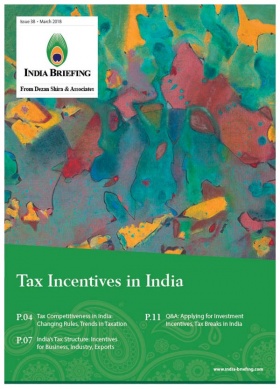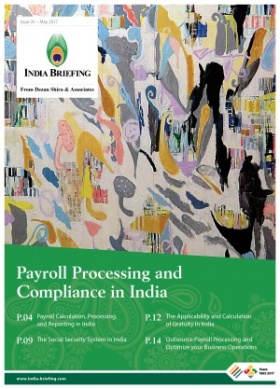India to Make Demat Shares Mandatory, Introduce New Disclosure Rules for Companies
The Indian government is doubling down on its drive towards greater financial transparency.
In the last four years, a number of legislative amendments and regulatory measures have targeted shell companies, benami holdings, black money transactions, financial reporting by banking institutions, and various means of tax evasion.
The latest move anticipated by the Ministry of Corporate Affairs will make it obligatory for unlisted public companies to dematerialize (demat) their shares.
Parallel to this, the Securities and Exchange Board of India (SEBI) announced that while investors could still hold shares in physical form after December 5, 2018 – they may not be able to transfer them after that deadline. This is to eliminate fraud by share-transfer agents.
Further, companies in India will need to maintain a record of “beneficial owners”. This was introduced in the Companies (Amendment) Act, 2017 early this year to improve corporate governance, and follow the norms set by the Paris-based Financial Action Task Force (FATF-GAFI) to combat money laundering.
Foreign investors doing business in India should pay attention to when changes in the establishment rules come into effect or risk an investigation for insufficient income disclosure or litigation due to compliance failures.
Complying with the newly approved legal norms ahead of official effect may prove to be conducive for firms operating in tightly regulated sectors, such as in aviation, print media and broadcasting, multi-brand retail trade, banking, and private security.
Dematerializing shares a new litmus test for tax authorities
The demat system converts physical shares into an electronic format, thereby making it easier for tax authorities to track shareholders as well as the real beneficiaries of shares.
An investor seeking to dematerialize shares needs to open a demat account with the Depository Participant (DP). A DP is the market intermediary through which investors can avail depository services, such as banks, brokers, custodians, and financial institutions.
India’s regulatory agencies, including the SEBI and MCA, have repeatedly called for the conversion of physical share certificates into electronic/demat form to lift the veil on opaque ownership of companies or benami ownership in shell companies.
While the Companies Act, 2013 already has a provision (Section 29) that mandates the issuance of securities in demat form for companies making public offers, the Depositories Act, 1996 states that an investor can hold shares either in physical or in demat form.
This legal ambiguity has allowed many investors in unlisted public companies to retain their shares in physical form, evading tax and financial scrutiny. Further, any move by the government mandating the conversion of shares will be an ambitious task, impacting over 55 million shareholders.
Existing rules are clear only in the case of listed companies in India where the dematerialization of shares is mandatory.
India has around 1.17 million active companies; about 80,000 to 90,000 such companies are identified as unlisted public companies. An unlisted public company is not listed on any stock exchange and can have an unlimited number of shareholders to raise capital for any commercial venture.
Under Indian law, an unlisted public company has more than 50 shareholders, a higher minimum capital requirement of Rs 500,000 (US$7,404), and must comply with statutory requirements, such as holding shareholder meetings and a cap on director remuneration.
Disclosure of beneficial ownership in a company
Changes to the Companies Act, 2013 (substitution of a new section for Section 90 in the principal Act) introduce new provisions related to “beneficial ownership” in a company.
Simply understood, beneficial owners are those persons who ultimately gain from the ownership of securities, even if they are legally held in someone else’s name.
Once the amendments get notified in the official gazette, the following compliances shall be mandatory:
- All companies in India will need to maintain a “register of beneficial owners”.
- Every company shall file a return of significant beneficial owners of the company, and any relevant changes in that record, with the Registrar of Companies – containing names, addresses, and other details.
Currently, amendments to the Companies Act classify the threshold for “significant beneficial ownership” at 25 percent. The MCA may, however, choose to implement a lower threshold at 10 percent – though this is as yet unconfirmed.
Such a move would cover a wider base of shareholders who are warehousing shares on behalf of someone else, with implications for voting arrangements and exercising outsize influence on company decision-making.
Failure to disclose beneficial ownership may attract penalties of up to Rs 100,000 (US$1,481) for individuals and up to Rs 500,000 (US$7,405) for a company and every officer of the company who is in default. In addition, continuing failure to comply will trigger a daily fine of Rs 1,000 (US$15).
The Companies Act also empowers the federal government to investigate cases of beneficial ownership.
About Us
India Briefing is published by Asia Briefing, a subsidiary of Dezan Shira & Associates. We produce material for foreign investors throughout Eurasia, including ASEAN, China, Indonesia, Russia, the Silk Road, & Vietnam. For editorial matters please contact us here and for a complimentary subscription to our products, please click here.
Dezan Shira & Associates provide business intelligence, due diligence, legal, tax and advisory services throughout India and the Asian region. We maintain offices in Delhi and Mumbai and throughout China, South-East Asia, India, and Russia. For assistance with India investment issues or into Asia overall, please contact us at india@dezshira.com or visit us at www.dezshira.com.
- Previous Article India’s Halal Market: Opportunities in Cosmetics, Personal Care Segments
- Next Article Singapore, India Trade Pact Review: Tariff Cuts, Flexible Rules of Origin under CECA














